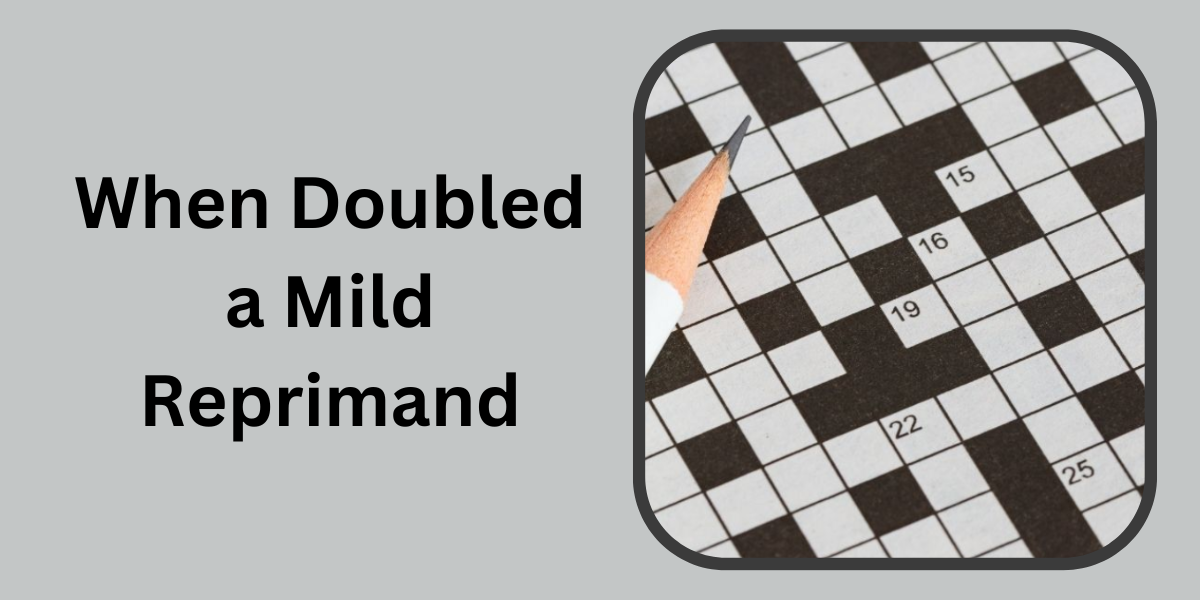In the world of communication, how we phrase criticism or feedback can significantly impact its reception and effectiveness. One intriguing phrase that encapsulates this notion is “when doubled a mild reprimand.” This phrase suggests that when a mild reprimand is intensified, it still remains relatively gentle but becomes more pronounced. In this blog, we will explore the meaning and implications of “when doubled a mild reprimand,” its usage in various contexts, and the fine line between constructive criticism and overly harsh judgment. We will also address some frequently asked questions (FAQs) to provide a comprehensive understanding of this concept.
What Does “When Doubled a Mild Reprimand” Mean?
The phrase “when doubled a mild reprimand” implies that a gentle form of criticism or correction, when slightly intensified, still retains its mild nature but becomes somewhat more significant. The doubling aspect refers to increasing the degree or emphasis of the reprimand without crossing into a harsh or severe territory. This concept is particularly relevant in settings where maintaining a respectful and constructive tone is crucial, such as in the workplace, educational environments, or personal relationships.
The Nuances of Mild Reprimands
A mild reprimand is a gentle way of pointing out a mistake, offering feedback, or correcting behavior. It is intended to be constructive rather than punitive, aiming to guide or improve without causing distress or defensiveness. When this mild reprimand is doubled, it means that the feedback is reiterated or slightly heightened, but still remains within the bounds of kindness and respect. The phrase “when doubled a mild reprimand” highlights the importance of delivering criticism in a manner that is effective yet compassionate.
The Importance of Constructive Feedback
In any relationship or professional setting, constructive feedback is vital for growth and improvement. The concept of “when doubled a mild reprimand” emphasizes the need to deliver feedback in a way that is helpful and encouraging, even when the message might need to be reinforced. Doubling a mild reprimand can serve as a gentle reminder or a second nudge, ensuring that the message is received and understood without causing undue discomfort or resentment.
Balancing Criticism and Encouragement
The art of providing feedback lies in finding the right balance between criticism and encouragement. When giving a reprimand, even a mild one, it is essential to consider the recipient’s feelings and the potential impact on their motivation and confidence. The idea of “when doubled a mild reprimand” suggests that it is possible to intensify the feedback slightly without crossing into negative territory. This approach can be particularly effective in nurturing a positive and supportive environment where individuals feel valued and understood.
When to Use “When Doubled a Mild Reprimand”
The concept of “when doubled a mild reprimand” can be applied in various scenarios, from professional environments to personal relationships. Here are a few examples of when this approach might be appropriate:
- In the Workplace: Managers and supervisors often need to provide feedback to employees. When an employee makes a minor mistake or needs to improve in a specific area, a mild reprimand can be doubled by providing additional guidance or setting clearer expectations. This approach ensures that the message is communicated effectively without causing unnecessary stress.
- In Educational Settings: Teachers and educators can use the concept of doubling a mild reprimand when addressing students’ behavior or performance. For instance, if a student frequently forgets to submit assignments, a mild reminder can be reinforced with a more explicit explanation of the consequences and the importance of responsibility.
- In Personal Relationships: In personal interactions, communication is key to maintaining healthy relationships. When addressing concerns or issues, doubling a mild reprimand can involve gently reiterating the concern and suggesting positive actions or solutions. This approach fosters open dialogue and mutual understanding.
FAQs
1. What is the meaning of “when doubled a mild reprimand”?
The phrase “when doubled a mild reprimand” means that a gentle form of criticism or correction, when slightly intensified, still remains relatively mild. The doubling aspect refers to increasing the degree or emphasis of the reprimand without making it harsh or severe.
2. How can “when doubled a mild reprimand” be applied in the workplace?
In the workplace, the concept can be applied when providing feedback to employees. For example, if an employee needs to improve in a specific area, a mild reprimand can be doubled by offering additional guidance or setting clearer expectations. This ensures the message is communicated effectively while maintaining a respectful tone.
3. Why is it important to balance criticism and encouragement?
Balancing criticism and encouragement is essential to maintain a positive and supportive environment. While constructive criticism helps individuals grow and improve, too much negativity can lead to defensiveness and decreased motivation. The concept of “when doubled a mild reprimand” emphasizes delivering feedback in a way that is both effective and compassionate.
Conclusion
The phrase “when doubled a mild reprimand” captures the delicate balance between providing constructive feedback and maintaining a supportive tone. In various contexts, from professional environments to personal relationships, the ability to offer criticism in a gentle yet effective manner is invaluable. Doubling a mild reprimand ensures that the message is reinforced without causing undue discomfort or negativity.
In this blog, we have explored the meaning and implications of “when doubled a mild reprimand,” the importance of constructive feedback, and the scenarios where this concept can be applied. By understanding and applying this approach, we can foster positive communication, encourage growth, and maintain respectful interactions. As we navigate the complexities of human relationships and interactions, the concept of “when doubled a mild reprimand” serves as a valuable reminder of the power of kindness and understanding in delivering feedback.
Read More Our Blogs
Learning Social Perspective Taking: A Pathway to Empathy and Understanding










